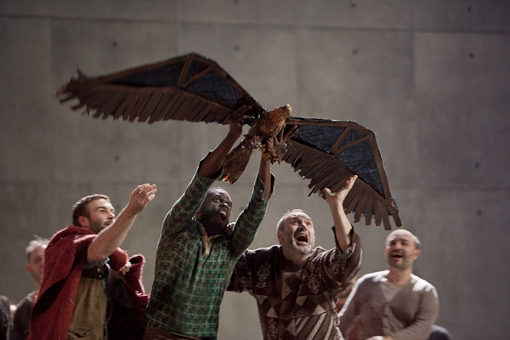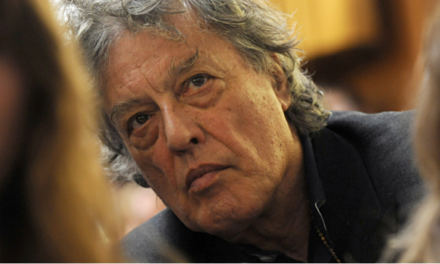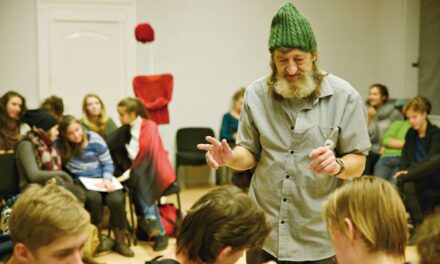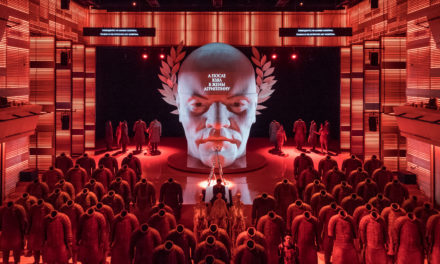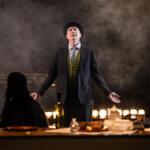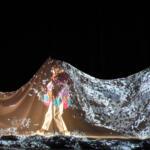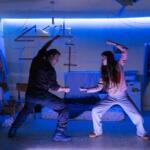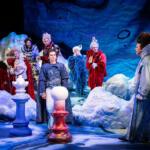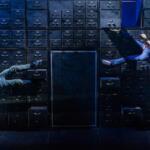Theatre and Opera Editor Marcina Zaccaria spoke with actor Jeff Burchfield in 2014, who was traveling to Berlin to perform in Leos Janacek’s From the House of the Dead.
American actor Jeff Burchfield, who was recently in the controversial production of Death of Klinghoffer at the Metropolitan Opera, will be traveling to Staatsoper Berlin for the production of Leos Janacek’s opera, Z Mrtveho Domu or From the House of the Dead.
For Burchfield, working on House of the Dead was a career dream-come-true. “As a very young actor, I wanted to work in European movies…When this finally came up, working in Europe with a renowned film director, it was a dream come true.”
He is revisiting From the House of the Dead after appearing in Patrice Chereau’s production in 2011 at the Metropolitan Opera. Burchfield says that it has been great to play to a 4000 seat house. He said, “The sheer number of people onstage is bigger than I have encountered…the work itself is about the singer and the songs, and that being said, there’s an interest in making the moment viable.”
Burchfield added opera to his resume after working for many years as a theatre actor. Burchfield’s productions have included Falstaff, Boris Godunov, and Death of Klinghoffer. He has also appeared in A Midsummer Night’s Dream at Brooklyn Academy of Music, and A Time of Spring, directed by Thierry Thieu Niang.
The Schiller Theater in Berlin where Burchfield will be performing in From the House of the Dead feels “like a smaller version of the Met, with several things going on simultaneously.” The argument can be made that opera is more celebrated in Berlin than in the United States. Burchfield describes the area around the opera house as having wide open spaces and being quite modern. “The feeling is a bit more industrial,” he said.
From the House of the Dead was Janacek’s last opera, before he died in 1928. The play was performed in Brno, two years after his death. The opera considers Goryanchikov, a “political prisoner.” Much of the drama happens outside of a Russian prison camp. Over the course of the opera, we hear from other prisoners including Shishkov, who tells the story of his imprisonment. A prison named Luka dies, and finally, Goryanchikov is released from prison.
The lush sounds of Janacek are a favorite with Czech and German audiences. According to Burchfield, Conductor Sir Simon Rattle takes a “most lush, more enveloping” approach to the music.
Leos Janacek was born in 1854 and was a contemporary of Dvorak. Janacek, who also wrote the libretto for From the House of the Dead, was known for his romantic compositions. Throughout his career, he composed operas, vocal, and orchestral music. His opera, Jenufa, was a hit with audiences.
According to Jonnie Rockwell, composer of Anthem, Janacek was intrigued by the Moravian National Opera. According to Rockwell, “He developed a lot of tonalities. He was influenced by Russian music, and brings in melodies with the tonality.”
From the House of the Dead is sung in Czech, and inspired by Czech speech. According to The Guardian, Janacek’s From the House of the Dead showed at the Vienna Festival in 2007. This same production was seen since 2007 in Vienna, Aix-en-Provence, and La Scala.
The production was directed by Chereau. The French stage and film director was the Artistic Director of Théâtre de Sartrouville in Paris. He was influenced by Giorgio Strehler at the Piccolo Teatro di Milano, Bertolt Brecht, and Antonin Artaud. His films included The Wounded Man, Persecution, and La Reine Margot.
Burchfield recalls that Chereau, who passed away in 2013, liked working with American actors, who seemed to have “emotional access and physical capability.” Workshops and rehearsals became a thorough process of working with the director and his collaborators.
“As I recall, a note I would get repeatedly, simpler, simpler, take it down, take it down – confident that it will still read. I believe in my own presence enough to believe that it will be enough. Don’t have to tell the whole story so emphatically. The information is there and the information is the collective,” said Burchfield.
The 2014 production at Staatsoper Berlin will be overseen by Peter McClintock, who was Chereau’s assistant. In a world where lead singers take the lead position, and chorus members keep the extraordinary language of song, Burchfield’s role in the opera is solely to act, and embody the characters onstage. The production is a revival of Chereau’s work.
In regards to keeping the intention from the original direction, Burchfield said, “We certainly want to preserve and protect that…And you make every performance fresh and viable.” To prepare, Burchfield has been listening to music, and reviewing the DVD.
A dream come true, as well as another great job, Burchfield is resolute and content before his travel. He said, “The idea of working in Europe is always what I’ve wanted…I have such respect for the art form for one thing…you can argue the point that opera is just really big show-biz.”
Five Americans and ten Italians will be returning to the production with Burchfield. He said, “American actors are more physical and internalized than the Europeans who tend to be more surface, more commedia oriented.”
Thierry Thieu Niang, the Artistic Collaborator, who devises choreographic movement, considers groups of prisoners in the production. They cower in corners and are carried to hospital beds. Throughout the play, they challenge illness and violence. In the previous productions, Burchfield played an old prisoner and a sick prisoner, coping with illness. Actors were encouraged to reference images in rehearsal for the 2011 production of From the House of the Dead.
Meanwhile, the musical composition has a vast, percussive feel. Brave New World Composer Jonnie Rockwell, said Janacek “wanted to combine Russian folklore with Russian literature…folklore and dances intrigued him. He used sticks on the ground and beats.”
The opera, From the House of the Dead, takes its story from Fyodor Mikhailovich Dostoyevsky’s Memoirs From the House of the Dead (1861-62). It was based on his own experiences in prison. As Dostoyevsky was a political prisoner, the opera deals with themes of loneliness and isolation, and Chereau often guided his actors toward photographs of the Russian wasteland. The opera is anything but void of emotion. The mostly male cast provides a sometimes stark, sometimes chilling sense of day-to-day survival in a Siberian prison.
The stage space is sometimes stark and grey. In terms of scenography, actors play an important role in defining the drama. Burchfield explained, “Because we are the environment. We, the actors, created the environment. We are the visual element. And the singers share the aural environment.”
“From the House of the Dead” will have five performances at Staatsoper Berlin beginning on December 7th and concluding on December 21st.
This post was written by the author in their personal capacity.The opinions expressed in this article are the author’s own and do not reflect the view of The Theatre Times, their staff or collaborators.
This post was written by Marcina Zaccaria.
The views expressed here belong to the author and do not necessarily reflect our views and opinions.

